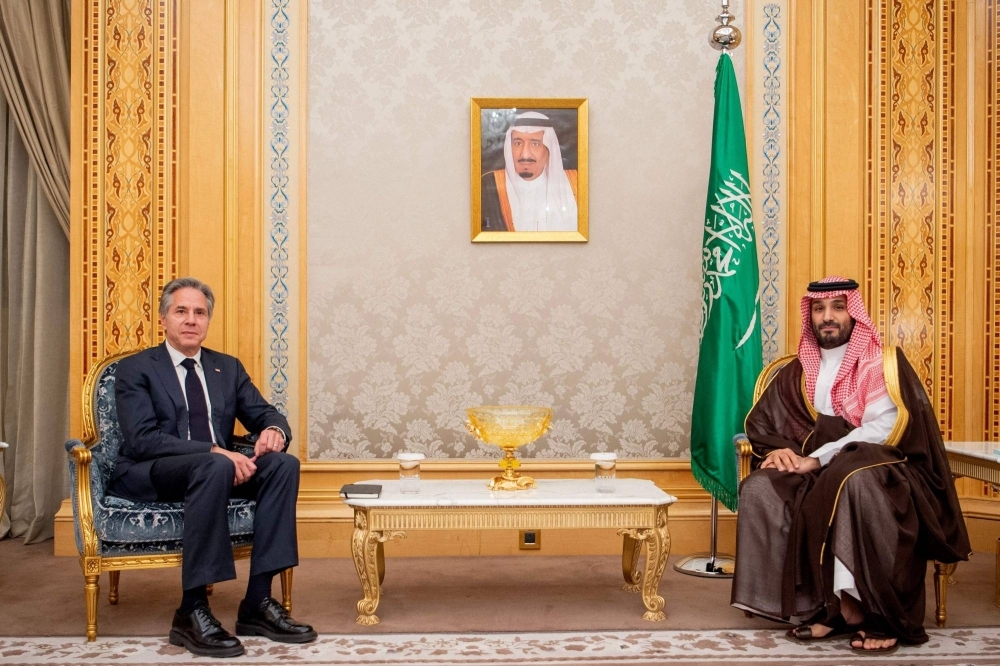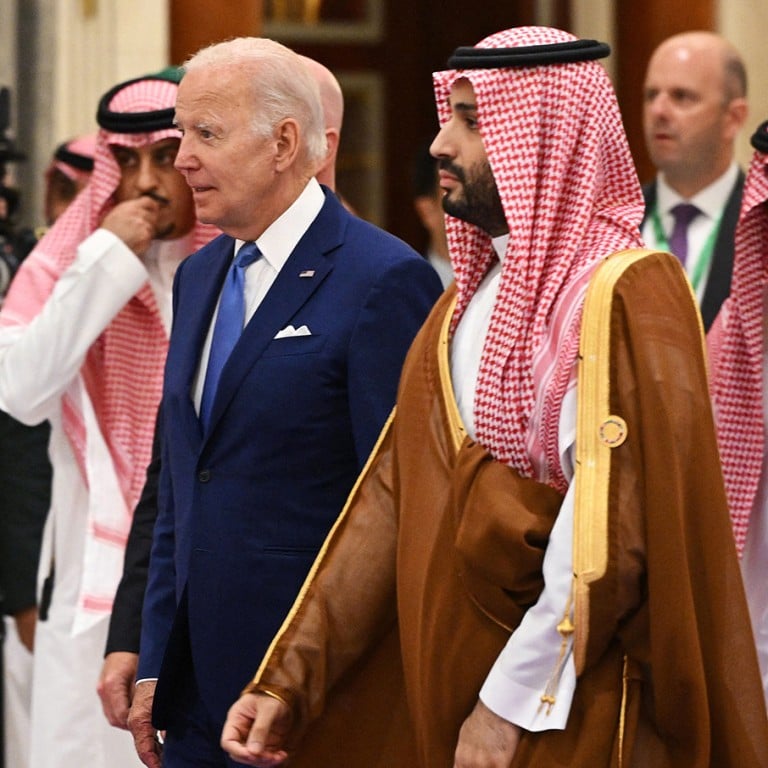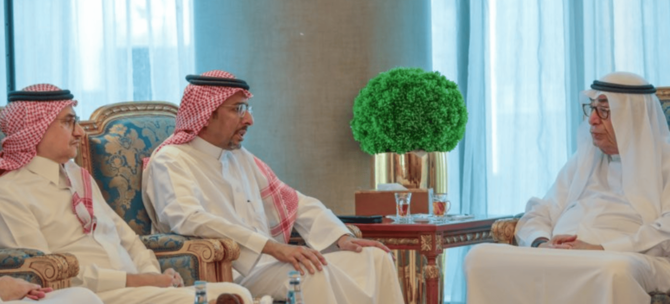Here's the Kicker: Beyond bolstering Israel and Saudi Arabia’s security, it would strengthen the United States' position in the region at the expense of Iran and even China.
A U.S.-Saudi Deal Without Israel Is an Illusion
The hype about a bilateral agreement is misplaced. Diplomatic normalization and a Palestinian state are needed to really change the regional playing field.
The U.S. and Saudi Arabia are nearing a historic pact that would offer the kingdom security guarantees and lay out a possible pathway to diplomatic ties with Israel if its government brings the war in the Gaza Strip to an end, people familiar with the matter have said.
The agreement faces plenty of obstacles but would amount to a new version of a framework that was scuttled when Hamas’ Oct. 7 attack on Israel triggered the conflict in Gaza.
Negotiations between Washington and Riyadh have sped up in recent weeks, and many officials are optimistic they could reach a deal within weeks, according to the people, who asked not to be identified discussing private deliberations.
Such an agreement would potentially reshape the Middle East.
Beyond bolstering Israel and Saudi Arabia’s security, it would strengthen the United States' position in the region at the expense of Iran and even China.
- The pact may offer Saudi Arabia an arrangement strong enough to need the U.S. Senate’s approval and even give the world’s biggest oil exporter access to advanced U.S. weapons that were previously off-limits.
- Saudi Crown Prince Mohammed bin Salman would agree to limit Chinese technology from his nation’s most sensitive networks in exchange for major U.S. investments in artificial intelligence and quantum computing, and get American help to build out its civilian nuclear program.
The key conditions for Netanyahu of ending the Gaza war and agreeing to a pathway for Palestinian statehood would be no small feat.
The proposal is fraught with doubt and may not come to fruition, which people familiar with the planning readily acknowledge.
Getting American lawmakers to approve a deal that commits the U.S. to militarily protecting Saudi Arabia would be a daunting prospect for the White House, especially if Israel opts not to join it.
- Many lawmakers remain wary of Crown Prince Mohammed, the kingdom’s 38-year-old de facto ruler, after the killing of Washington Post columnist Jamal Khashoggi by Saudi agents in 2018.
- They’re also uneasy about the Saudi strategy of lowering oil production, along with other members of the OPEC+ cartel, to prop up prices.
- His coalition says it still plans to attack the Gazan city of Rafah, which the U.S. and Arab states fear would lead to thousands more deaths among Palestinian civilians.
- Such an attack would also jeopardize prospects for a short-term cease-fire that U.S. Secretary of State Antony Blinken — who met Netanyahu in Jerusalem on Wednesday — says is a priority for President Joe Biden.
Still, the leaders of the three countries have plenty of incentives to reach an agreement soon.
For Biden, it’s a chance for a foreign policy victory before the U.S. presidential election in November.
The crown prince would avoid the uncertainty about whether former President Donald Trump would accept a deal if he wins that race, even though Trump’s administration initiated the Abraham Accords that envisioned such alliances between Israel and its neighbors.
U.S. officials said talks are underway but declined to comment on specifics.
Saudi Arabia’s government didn’t immediately respond to a request for comment.
Netanyahu’s office declined to comment.
Earlier Wednesday, The Guardian reported the U.S. and Saudi Arabia had drafted a set of agreements linked to a broader Palestinian peace deal.
"We have done intense work together over the last months,” Blinken said on Monday while in Saudi Arabia. "The work that Saudi Arabia and the United States have been doing together in terms of our own agreements, I think, is potentially very close to completion.”
At the same event, Saudi Foreign Minister Faisal bin Farhan said an agreement was "very, very close.”
Aspects of the deal would mirror agreements the U.S. has made in recent months with other regional partners, including the United Arab Emirates.
In that case, Abu Dhabi’s top artificial intelligence firm, G42, agreed to end cooperation with China in exchange for an investment from Microsoft Corp.
In the case of Saudi Arabia, which is also eager to locally develop artificial intelligence and semiconductors, the U.S. has said it can’t do so with American help if it keeps Chinese technology.
Saudi Arabia would need to agree not to pursue cooperation on advanced technology with U.S. adversaries, a person familiar with the matter said.
And Saudi Arabia would get to fulfill its long-sought wish for a civilian nuclear program. In exchange, the U.S. would gain access to the kingdom’s uranium, the person said.
Shift in approach
As originally conceived, the agreement would have been a three-way deal that forged Saudi-Israeli diplomatic relations along with greater investment and integration in the region.
Now, the U.S. and Saudi Arabia see a deal with each other as central to ending the war between Israel and Hamas, which has roiled the wider Middle East and led to huge protests in the West.
The two countries would offer Israel a series of economic, security and diplomatic incentives if it scales back plans for an invasion of Rafah and quickly concludes its war with Hamas.
For Netanyahu, another advantage is that a pact would help counter Iran’s aggression. Since the war in Gaza erupted, Israel and Iran have exchanged their first-ever direct fire against one another and Tehran’s proxy militias such as Hezbollah have regularly attacked the Jewish state.
International support for Netanyahu’s position is waning the longer the war continues. U.S. polling backs that up.
Roughly a third of Republicans in seven swing states oppose continued aid to Israel, as do four in 10 Democrats and independent voters, according to a recent survey.
US and Saudis near historic pact. Could it reshape the Middle East?
Plan would offer incentives for Israel to end the war with Hamas in Gaza
Accord would pave the way for Saudi Arabia to get advanced weapons
Analysis |
Saudi Arabia and the U.S. Want a Mutual Defense Pact – With or Without Israel
Saudi Arabia and U.S. to go for a mutual defense pact with or without Israel| Here is Saudi's ‘Plan B’
_________________________________________________________________________________
RELATED FROM 2022
07 December 2022
1st China-Saudi Summit Moves Beyond US in The Middle East & Gulf States
The summit with Saudi Arabia, chaired by King Salman and attended by Crown Prince Mohammed bin Salman (MBS), the kingdom’s de facto ruler, comes after Xi was confirmed for an unprecedented third term as president in October.
Xi to attend China-Arab summit, China-GCC summit, visit Saudi Arabia
BEIJING, Dec. 7 (Xinhua) -- Chinese President Xi Jinping will attend the first China-Arab States Summit and the China-Gulf Cooperation Council (GCC) summit in Riyadh, Saudi Arabia, and pay a state visit to Saudi Arabia from Dec. 7 to 10 at the invitation of King Salman bin Abdulaziz Al Saud of Saudi Arabia.
Chinese Foreign Ministry spokesperson Hua Chunying made the announcement here on Wednesday. ■
Agreements worth $29 billion to be signed during China’s Xi visit to Saudi Arabia
The Chinese president will embark on an official visit to Saudi Arabia on Wednesday at the invitation of Saudi Arabia’s King Salman bin Abdulaziz.
Xi’s visit to the Kingdom will run until December 9 during which a Saudi-Chinese summit headed by King Salman and the Chinese president, with the participation of Crown Prince Mohammed bin Salman, will be held.
In addition to the deals, China and Saudi Arabia will sign a strategic partnership agreement and a plan to harmonize the Kingdom’s Vision 2030 with China’s Belt and Road Initiative.
The summit will also witness launching Prince Mohammed bin Salman Award for Cultural Cooperation between Saudi Arabia and China."
Read more:
China’s Xi hails Jiang as leader who stood up to West after Tiananmen crackdown
Saudi boom for non-oil businesses lifts activity to 7-year peak
Saudi Arabia’s Crown Prince reveals NEOM’s first luxury island Sindalah
Xi Jinping Gets Saudi Red Carpet as Middle East Looks Past US

Xi Jinping
Photographer: Wang Zhao/AFP/Getty Images
Updated on
Two months after snubbing US President Joe Biden’s pleas for oil, Saudi Arabia is rolling out the red carpet for his Chinese counterpart, Xi Jinping.
Xi will visit Saudi Arabia for several days starting Wednesday, during which he will take part in a regional summit with Saudi Crown Prince Mohammed bin Salman and other Arab leaders, the kingdom’s SPA state news agency said, promising agreements worth some $30 billion. Energy and infrastructure deals will top the agenda, according to two people briefed on the plans."


.gif)

.gif)










No comments:
Post a Comment